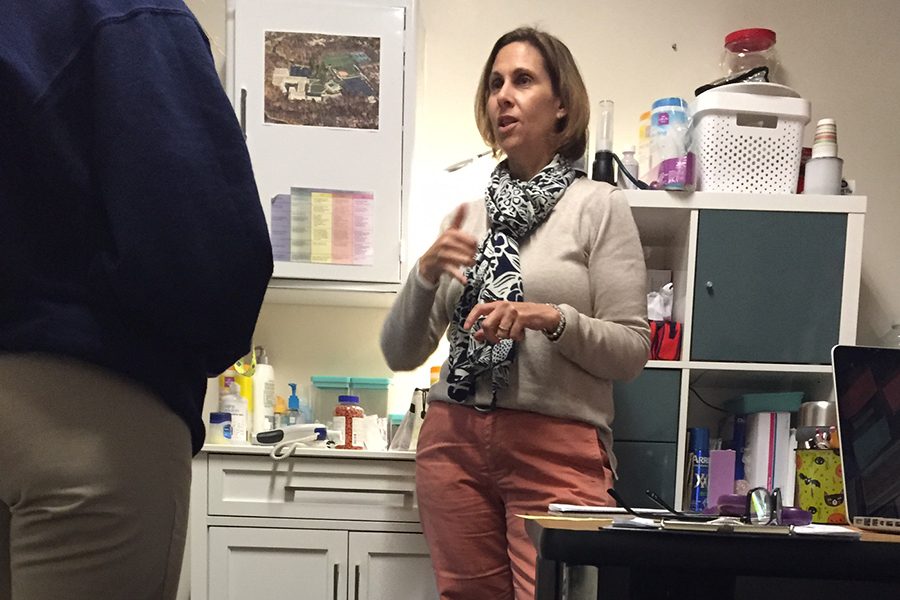Nurse offers advice for flu season
Mourouzis assists students, staff in staying healthy
In her office, school nurse Mrs. Susan Mourouzis assists a student. With the flu season in full swing, the nurse offered tips for avoiding getting sick.
Each year hundreds of thousands of hospital stays and thousands of deaths are caused by influenza, also known as the flu. This virus causes a respiratory illness which affects the nose, throat and lungs.
However, the flu is not to be confused with other illness which might affect these areas, such as a stomach virus or a cold. While a cold might cause mild symptoms similar to those of the flu, symptoms of the true flu will begin quickly and be more severe. “Flu almost immediately makes you feel like you’ve been hit by a bus,” school nurse Mrs. Susan Mourouzis said.
Worse this year
This year, the flu will be more widespread than in past years. However, it is not the virus itself which is causing the severity of the illness but rather the weakness of this year’s vaccine.
“Every year flu shots are basically a prediction of what the Centers for Disease Control believe might be the strains of flu that might be out there,” Mourouzis said. “If you don’t predict correctly, you sometimes have a year like this,” she said.
Although this year’s vaccine is less effective, an annual flu shot is still important and, according to the CDC, a flu vaccine can reduce the risk of becoming ill with the flu by approximately half. Even if this year’s vaccination is not as effectual, “it still helps a little bit,” Mourouzis said. Many pharmacies and doctors offices still allow
Importance of vaccine
Vaccinations are often covered by health insurance, but the school provides a flu clinic free of charge for teachers whose vaccinations are not covered by their insurance in an effort to minimize absent days for teachers, Mourouzis said. “One thing we value here at our school is our teachers being here teaching our students,” she said.
The CDC promotes vaccination as the best way to protect against influenza, Mourouzis said. “For the most part, that is the biggest control factor when you’re talking about preventing widespread diseases,” she said.
In addition to vaccination, other measures can be taken to protect against influenza. Since the flu is a respiratory disease spread by droplets from coughing and sneezing while infected, be sure to cover either with a hand or elbow. Also, wash hands frequently throughout the day.
“When you have flu virus on your hands you can inoculate yourself. Hand washing is one really easy way to protect yourself from the flu,” Mourouzis said.
Stay away from school
Good health is not always a guarantee and sometimes illness is inevitable. When sick with the flu, do not come to school until recovered. The school follows the CDC recommended guidelines and asks students with fevers to remain at home if the fever is over 100 degrees and return to class only after 24 hours fever free without medication.
Students might be tempted to attend school even with flu symptoms, but they should not do so, Mourouzis said. Staying home with prompt a quicker recovery, she said, but it also protects classmates from the contagious virus.
This is especially important with regards to students or staff who might have severe health consequences upon catching the flu as a result of their medical situations, Mourouzis said. “There are people in our school community who have health conditions who are at high risk of having lots of complications from the flu,” she said. “You deciding to be at school when you’re sick could actually have really really dire consequences for them,” she said.
Preliminary steps can be taken to protect against ever contracting the influenza virus, and vaccinations are the primary defense, according to the CDC.
Upon catching the flu, staying home is essential not only for personal health but also for the safety of the students and staff, Mourouzis said.
“When you stay home you’re not only thinking about helping yourself feel better but also protecting somebody from getting really sick,” Mourouzis said. “Think about that whole picture when you’re thinking about trying to come back to school.”







